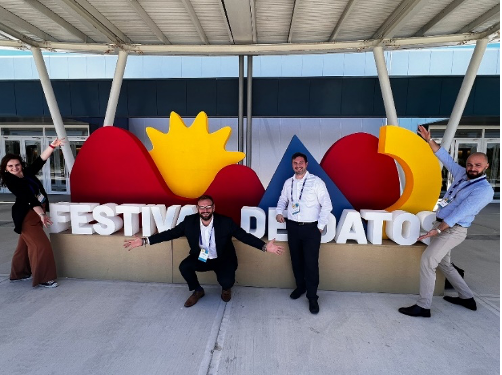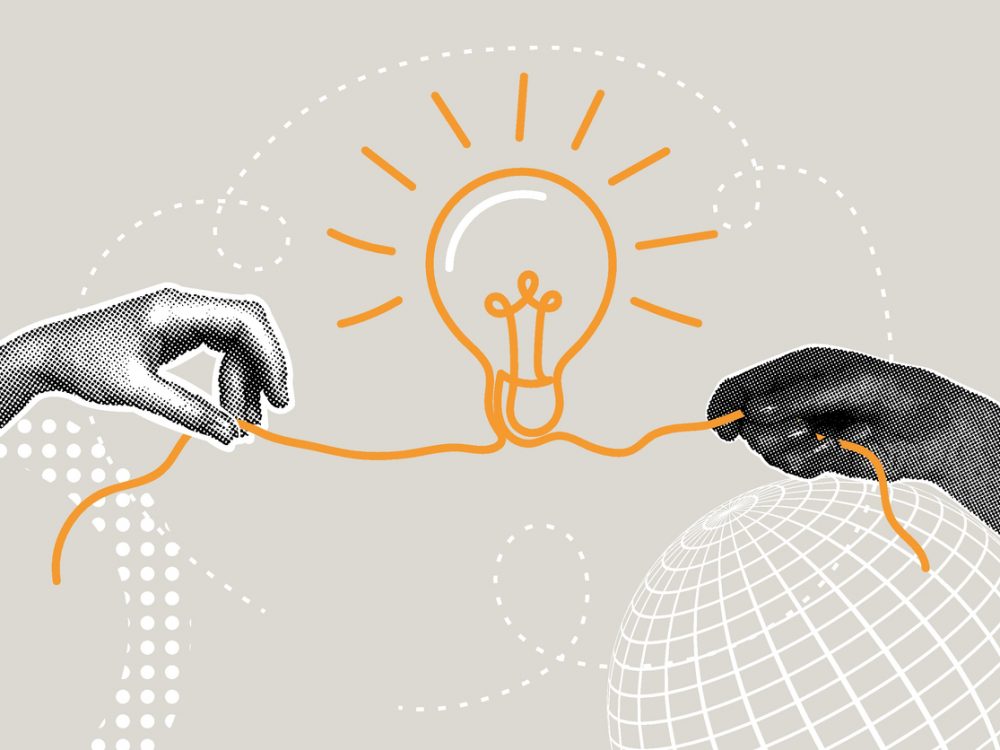
Developing Data Systems: Five Issues IREX and DG Explored at Festival de Datos
Both IREX and Development Gateway: An IREX Venture (DG) participated in Festival de Datos. This conference, held in Uruguay from November 7-9, 2023, is the flagship event of the Global Partnership for Sustainable Development Data and convenes the data for development community to explore how to use data to tackle pressing global issues, including democracy, human rights, climate change, and agricultural economies. At Festival de Datos 2023, IREX and DG participated in nine sessions in which we shared our work to develop effective and inclusive data systems.
What are data systems and why are they important?
Data systems are comprised of various data-related elements within or across institutions that can support decisions and potential solutions for a specific issue. These elements include datasets, digital tools, user communities, protocols, and partnerships.
Improving how these elements engage with each other is important in making data actionable, especially to solve problems; however, making these improvements requires thoughtful consideration to mitigate potential harms to people and communities. At Festival de Datos, IREX and DG explored the five issues below to support mitigating potential harms and furthering possible benefits of data systems.
1. Sub-national and local data systems rely on community engagement and ownership.
An increasing priority among the data for development community is investing in data systems at the sub-national and local levels. Despite this priority, activities and resources developed to improve data systems often do not incorporate community engagement as a key part of the process. This limitation was highlighted in a session on agricultural data facilitated by Annie Kilroy, DG’s Technical Advisor for Data and Analytics.
During this session, Kilroy and others noted that there is significant demand among local partners to invest in farm-level data; however, farmers’ willingness to contribute to data collection is sometimes limited because of insufficient protection, transparency, and ownership in the data collection and use.
To address concerns about data ownership, both IREX and DG have systems that give citizens control over how data collected from them and their community is collected and used. For example, IREX’s Data Zetu program is a citizen engagement program to improve access to public health resources, and DG’s Open Contracting Portal is a digital tool increasing transparency in government contracts and supporting local businesses looking to fill them. While each of these examples are unique, both programs work with community members to understand local perspectives around specific challenges and create ownership in those solutions after the programs have ended.
2. Effective data partnerships require the ability to access and process data along with trust, transparency, ownership, and feedback.
During a plenary session at Festival de Datos, DG CEO Josh Powell and others highlighted four steps to building effective data interoperability practices to support data partnerships. Advancing data partnerships, in which actors share data to create solutions to specific challenges, is important because they help address challenges across data systems and sectors. However, these partnerships are often limited by the insufficient ability to access and process data from multiple sources; therefore, improving the ability to access and process data through the following four steps is vital:
- Improve trust between institutions by facilitating transparent data-sharing on common problems;
- Be transparent with how data is being used and securely stored and accessed;
- Establish a clear ownership of datasets with the institutions and communities they reflect, avoiding an extractive power-dynamic; and
- Develop accessible feedback loops that communities and stakeholders can continuously learn from and validate elements of their datasets.
DG has also helped develop tools, such as the data maturity assessment, to support data administrators in accomplishing these steps by acknowledging the functions and considerations at the organizational, human, data, and technological levels.
3. Advancing inclusion in a data system requires an understanding of the local context.
In a joint session facilitated by IREX and DG, Annie Kilroy and Philip Davidovich, IREX Technical Advisor for Data and Digital Literacy, explored what makes a data system inclusive and how inclusion can be assessed and improved. Improving inclusion in data systems is essential because it allows for higher quality datasets that more accurately reflect the perspectives and issues existing in the communities connected to the data. Inclusive data practices also ensure that data is collected and used for all people, regardless of location, ethnicity, gender, or age.
Using IREX’s Data Compass methodology that customizes the development of indicators to reflect local considerations, Kilroy and Davidovich highlighted the formal and informal elements associated with assessing inclusion in different environments. Overall, this session highlighted that the ability to meaningfully improve inclusion requires a refined assessment framework that’s responsive to local contexts and problems. Resources such as IREX’s Data Compass and DG’s CALM methodology apply that level of customization to create inclusive data systems that are holistic and reflect local conditions.
4. Data governance, which is evolving, is a key enabler in developing a responsible and ethical data system.
Tom Orrell, a senior advisor at DG, facilitated a peer learning discussion around two emerging issues in the data governance space. Data governance practices—the policies, actions, decisions, and technologies that guide institutions and communities on data use—are rapidly evolving to keep up with new technologies and emerging issues. Because data governance is a key enabler in how data systems function, incorporating responsible and ethical considerations into data governance frameworks was a major topic of discussion throughout the festival. Emerging issues that surfaced in Orrell’s session were:
- Africa’s emerging data governance frameworks should balance Africans’ own interests with those of other geopolitical blocs, including the United States, the European Union, and China; and
- The many conversations on using artificial intelligence and machine learning tools indicate that the field of data governance itself is rapidly evolving.
In response to the rapidly changing data governance space, DG is considering how to incorporate innovative approaches in their work, especially as their long-standing digital tools that impact users’ data governance approaches are repurposed to address emerging global issues.
5. Building a data culture helps sustain effective data systems, and it starts by investing in people.
Finally, building an inclusive data culture was the focus of a lightning talk and Q&A discussion facilitated by Davidovich. Building a sustainable and impactful data system requires investing in individual users’ data skills, such as literacy, analysis, and decision-making. After all, every actor that engages in a data system contributes to the culture in how that data is collected, managed, and used, which impacts the effectiveness of the data system. Therefore, the culture of a data system needs to be inclusive of everyone within that system.
To support this inclusivity, IREX recently created the Data Learning Journey Playbook, a field-tested resource with independent and team activities on building and sustaining data culture and skills in global development. In the session, Davidovich highlighted the five skills the Playbook offers support in building:
- Identifying an opportunity to use data;
- Achieving your data literacy needs;
- Working with data responsibly;
- Fostering effective discussions around data; and
- Building collaborative data practices.
By participating at Festival de Datos and highlighting these five key issues related to data systems, both IREX and DG hope to engage the development data community in finding innovative solutions that ensure data and technology support local leaders and global communities to create more just, prosperous, and inclusive societies.
Share
Recent Posts

Shared Struggles, Shared Solutions: Education and Cross-Sector Data Use Insights
This blog draws on DG’s experience in climate, health, aid management, and agriculture to explore connections between the challenges of data collection, data hosting, and data governance across different sectors and what the solutions to overcoming them can teach us about strengthening education data systems.

Economic Toll of Tobacco-Related Diseases in Kenya: New Research Findings
Development Gateway: An IREX Venture (DG) is pleased to announce the publication of a research manuscript on the Economic Costs of Tobacco-Related Illnesses in Kenya. This research was carried out as part of the Tobacco Control Data Initiative (TCDI) activities in Kenya and is part of a broader report on Morbidity and Mortality from Tobacco Use in Kenya.

The Data Crisis Following USAID’s Withdrawal: Opportunities to Reimagine Data Systems
For decades, USAID and other US government funding supported global data systems, from health surveys and early warning tools to digital infrastructure for ministries. The abrupt termination of USAID funding has triggered twin crises: a halt to data collection and the undermining of digital systems – reveal existing inefficiencies and instabilities in how data is collected, managed, and shared both within and between countries.